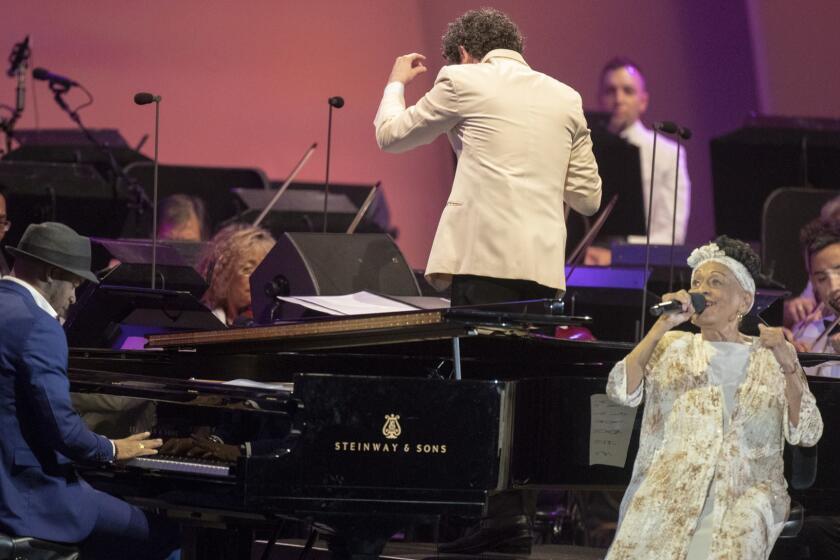
Omara Portuondo is famous for being part of the Buena Vista Social Club, but her life extends far beyond that iconic group. A new PBS documentary, “Omara: Cuba’s Legendary Diva,” explores the full story of her life, revealing both its beauty and its challenges.
I’m really excited about this new documentary by Hugo Perez! It’s premiering on PBS soon, and it tells the story of Portuondo’s life – but it’s so much more than just a biography. It explores what it means to be Afro-Cuban, and how she’s navigated all the political challenges Cuba has faced over the years. It sounds incredibly personal and powerful.
Perez explained in a statement that he realized this was an incredible opportunity – a chance to collaborate with a renowned artist nearing the end of their career. He compared it to traveling back in time to work with legends like Ella Fitzgerald or Billie Holiday when they were older.
When we started the project, Omara was already in her late eighties and still actively touring the world. Despite consistently selling out shows, she faced ageism from promoters and the media, who kept focusing on the idea of a ‘final tour.’ I saw a chance to capture not only the story of a legendary artist, but also how she dealt with this age bias – with energy, style, and a playful attitude. You should never underestimate a Cuban woman.

Cuba’s Omara Portuondo comes to the aid of L.A. Phil, Dudamel at the Bowl
Gustavo Dudamel is best known as a classical conductor, not a jazz musician. However, when unexpected issues disrupted his scheduled concerts at the Hollywood Bowl this week, the L.A.
Omara Portuondo was born in Havana, Cuba, on October 29, 1930, to a biracial family – a time when such relationships were frowned upon. She began performing at age 17, joining the dance troupe of the famous Tropicana Club. In the 1950s, as part of Cuarteto d’Aida, she shared the stage with Nat King Cole, toured the United States, and recorded music. She continued to thrive as a solo artist from the late 1960s through the 1980s, also appearing in film and television.
She was always actively engaged with current political issues and wasn’t afraid to sing about revolutionary figures like Che Guevara. In 1974, she released an album honoring Salvador Allende, the Chilean socialist president who had been overthrown by the United States.
Omara Portuondo joined the celebrated Cuban group, the Buena Vista Social Club, and began touring internationally in the mid-1990s. The band gained huge popularity in 1999 thanks to a critically acclaimed documentary directed by Wim Wenders, also titled “Buena Vista Social Club,” which even received an Academy Award nomination. The film beautifully showcased Portuondo’s incredible talent and the rich history behind her music, captivating audiences around the world.
I was so thrilled to see the incredible story of the Buena Vista Social Club come to life as a musical! It was amazing when it finally hit Broadway in 2025, and even more special when Natalie Venetia Belcon – who played Omara Portuondo in the original cast – won a Tony Award this year for her performance. She truly captured the spirit of Omara and the whole group!
Movies
The 1997 album “Buena Vista Social Club” and the 1999 documentary about their tour by Wim Wenders brought the vibrant, classic Cuban music style known as son back into the spotlight after years of being largely unknown.
Omara Portuondo is best known as a star of the Buena Vista Social Club, but a new documentary shows she’s still a vibrant performer even at an advanced age, continuing to tour the world. The film features interviews with fellow musicians from around the globe, including Diego el Cigala, Roberto Fonseca, and Arturo O’Farrill.
The film includes some of Portuondo’s latest performances, showcasing a deeper and more powerful side to her artistry.
As a total film buff, I really loved what the director said about wanting to show Omara performing *now*. They wanted the songs to actually *tell* her life story, and it makes perfect sense. Apparently, when Omara sings about love, she really digs into the pain of heartbreak, and the director couldn’t imagine making the movie without showing those powerful performances. It’s about letting the music do the talking, you know?
Read More
- Clash Royale Best Boss Bandit Champion decks
- Best Hero Card Decks in Clash Royale
- Clash Royale Witch Evolution best decks guide
- Ireland, Spain and more countries withdraw from Eurovision Song Contest 2026
- Clash Royale December 2025: Events, Challenges, Tournaments, and Rewards
- JoJo’s Bizarre Adventure: Ora Ora Overdrive unites iconic characters in a sim RPG, launching on mobile this fall
- ‘The Abandons’ tries to mine new ground, but treads old western territory instead
- How to get your Discord Checkpoint 2025
- Best Builds for Undertaker in Elden Ring Nightreign Forsaken Hollows
- LoL patch notes 25.24: Winter skins, Mel nerf, and more
2025-09-26 23:31